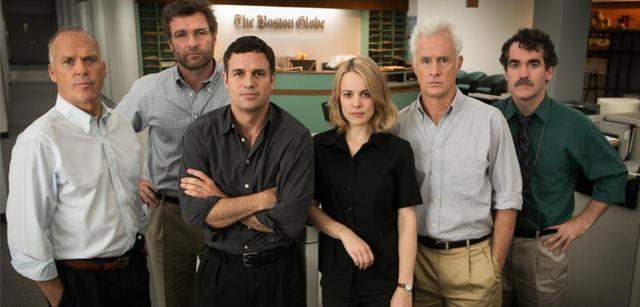In the good old days of print journalism (and assuming this writer would ever get a job for a magazine or newspaper), a review of an awards hoover like Spotlight would be anticipated, without previews, hints on Twitter or hot takes. Tom McCarthy’s film is a throwback to such a time, but it’s not as far away as we might like to think. Spotlight digs into the archaic facades of two slowly-crumbling monuments, the Catholic Church and investigative print journalism, and discovers greater truths underneath. It goes about its task in a matter-of-fact way, but its story is too fascinating to be impeded by filmmaking flourishes. Or is it?
The Boston Globe’s monumental story on the extent of sexual abuse committed by clergy in the Catholic archdiocese of Boston broke in January 2002. Spotlight opens on a scene long before that, as a bishop and lawyer visit a police precinct in suburban Boston in 1976 to deal with an accusation against a priest. This prologue sets in place what future generations will be up against: a shadowy organisation trying to keep a dirty secret, aided and abetted by having friends in high places. The Church’s effective omerta on child abuse is now common knowledge, and the phenomenon has been covered on film already (The most notable examples are documentaries such as Alex Gibney’s Mea Maxima Culpa and Amy Berg’s Deliver Us From Evil). Telling this story through the prism of feature filmmaking requires a deft hand. McCarthy’s approach is to shift the focus from the abuse story to the investigation and those undertaking it, and to let that story speak for itself. The direction towards the abuse cases is given by new Globe editor Marty Baron (Liev Schreiber), who reads a competitor’s article on an out-of-court settlement and asks about a follow-up. The unsung hero of Spotlight is Schreiber’s calm dignity as Baron, a Jewish blow-in in a Catholic town; the outsider looking in seeks the truth.
We’re quickly introduced to the Globe’s Spotlight investigation team. Led by Walter ‘Robby’ Robinson (Michael Keaton), the team of Mike Rezendes (Mark Ruffalo), Sacha Pfeiffer (Rachel McAdams) and Matt Carroll (Brian d’Arcy James) are given a task that sees them digging into an organization that defines their city. An early meeting between Baron and Cardinal Law (Len Cariou) sees the latter lay down his namesake by presenting Baron with a Catholic catechism, declaring that all one needs to know about Boston is contained therein. Moments like this only increase the resolve of both Spotlight and the audience to get to the truth. Law is the closest we get to a central bad guy, as the Church’s power allows the blame to get spread around with a horrifying efficiency. The law firms that mediated for the victims come under scrutiny (enter Billy Crudup with a neat, not-quite-boo-hiss role as leading lawyer Eric MacLeish), and the paper finds a reluctant ally in a lawyer for the victims, Mitch Garabedian. In this role, Stanley Tucci continues his wonderful habit of beefing up side roles with his trademark mix of determination and gravitas.
All of the Spotlight team are self-described lapsed Catholics, so to watch them investigate this institution should prove fascinating on a personal level. However, McCarthy and Josh Singer’s script is more interested in how the story was broken than the ones breaking it. Spouses and personal lives are mentioned but hardly glimpsed, which means the actors have to fill in the blanks. Ruffalo’s energetic boy scout is counterbalanced by McAdams’ compassionate focus, but the supports are the standouts. Keaton and d’Arcy James invest their professional old schoolers with an everyday identifiability, and John Slattery snaffles scenes from everybody as the Globe’s deputy editor Ben Bradlee Jr. His role is the active link to Spotlight’s greatest influence. All The President’s Men may have had Bradlee Sr.as editor and the benefit of Deep Throat’s intelligence, but it also had a greater sense of the historical import of its story (not to mention Gordon Willis’ peerless mood lighting). Spotlight tells its story efficiently, and celebrates the good work behind it. It doesn’t dress up the facts; McCarthy’s direction is largely observant, occasionally finding a frame to use or a moment for a West Wing-style walk-and-talk. Masanobu Takayanagi’s cinematography is defined largely by varying shades of grey, and the piano strikes on Howard Shore’s score hit somewhere between a clock tick and a church bell. It’s all perfectly valid, but a lack of imagination might be to its detriment in the memorability stakes. Spotlight might be too late to its own story to carry influence, but it’s a story worth telling and the film does it justice with respect and a sharp focus, no less and not much more.

